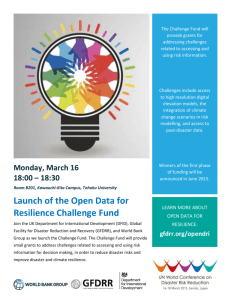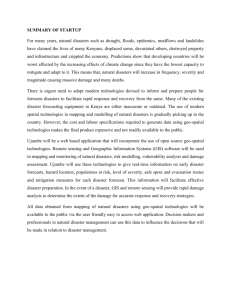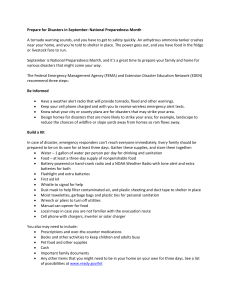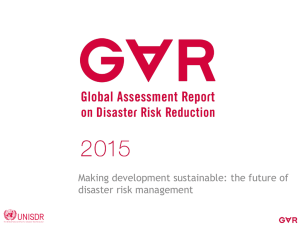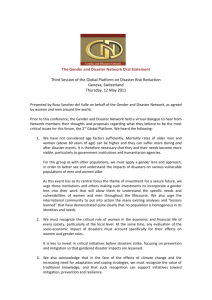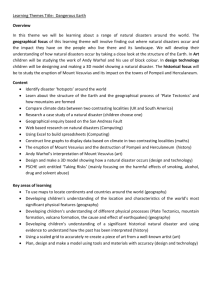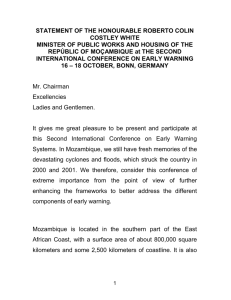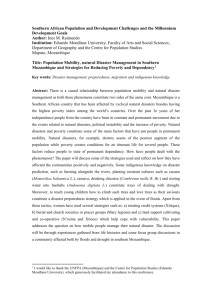Read - PreventionWeb
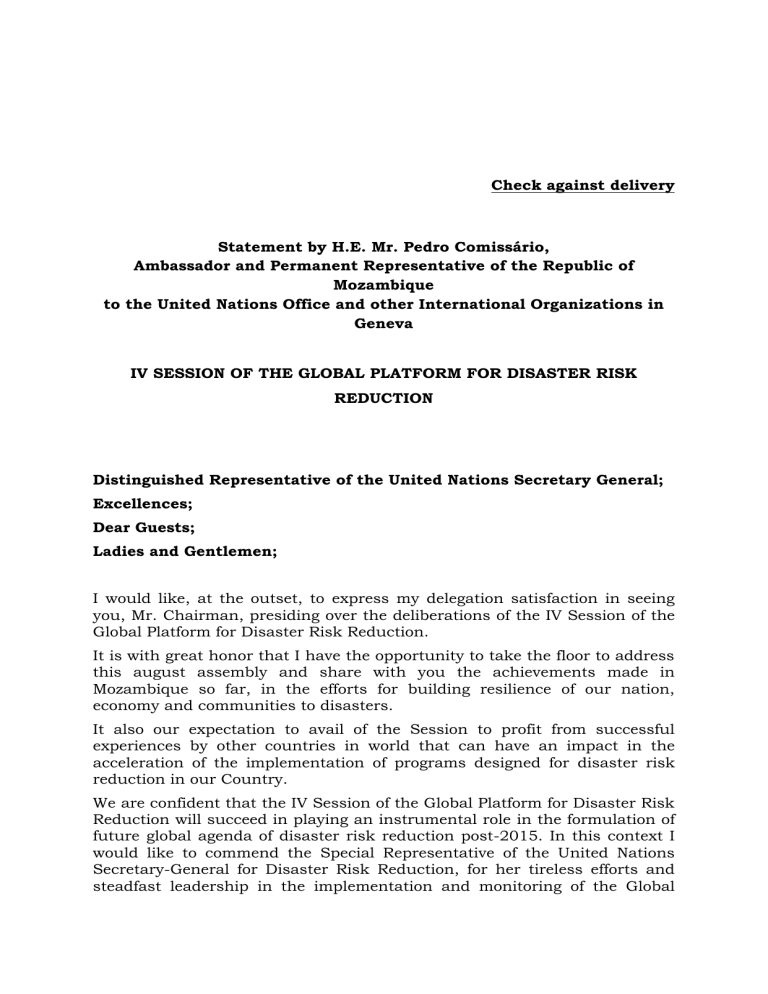
Check against delivery
Statement by H.E. Mr. Pedro Comissário,
Ambassador and Permanent Representative of the Republic of
Mozambique to the United Nations Office and other International Organizations in
Geneva
IV SESSION OF THE GLOBAL PLATFORM FOR DISASTER RISK
REDUCTION
Distinguished Representative of the United Nations Secretary General;
Excellences;
Dear Guests;
Ladies and Gentlemen;
I would like, at the outset, to express my delegation satisfaction in seeing you, Mr. Chairman, presiding over the deliberations of the IV Session of the
Global Platform for Disaster Risk Reduction.
It is with great honor that I have the opportunity to take the floor to address this august assembly and share with you the achievements made in
Mozambique so far, in the efforts for building resilience of our nation, economy and communities to disasters.
It also our expectation to avail of the Session to profit from successful experiences by other countries in world that can have an impact in the acceleration of the implementation of programs designed for disaster risk reduction in our Country.
We are confident that the IV Session of the Global Platform for Disaster Risk
Reduction will succeed in playing an instrumental role in the formulation of future global agenda of disaster risk reduction post-2015. In this context I would like to commend the Special Representative of the United Nations
Secretary-General for Disaster Risk Reduction, for her tireless efforts and steadfast leadership in the implementation and monitoring of the Global
Agenda for Disaster Risk Reduction. We equally thank the United Nations
International Strategy for Disaster Reduction Office (UNISDIR) for all support bestowed to our countries and regions in this domain.
We believe that together we will succeed in taking stock of the lessons and experiences learned to bring about a post-2015 Hyogo Framework for Action that is in line with the overall objectives of development, a Guiding
Framework that establishes global and national goals of reducing the risk of disasters, a Framework that facilitate and set standards for monitoring and accountability on the implementation of the Agenda for Disaster Risk reduction, a Framework that beside the reduction of losses in human lives, it strengthen the protection of development gains and contribute for poverty reduction.
Excellences;
Dear Guests;
Ladies and Gentlemen,
Mozambique is a country highly vulnerable to climate disasters, such as tropical cyclones, floods and droughts and earthquakes due to its geographical location in the Indian Ocean Shores, along the African Rift, prone to severe climate variations.
In our country weather related disasters are cyclical, frequent and extensive, causing huge human losses and widespread damage and annual economic losses in excess of 1% of our Gross Domestic Product. In the most critical years like 2000 and 2013, disasters cost the country about 20% of our
Gross Domestic Product.
The Government has been taking action to strengthen our ability to prevent disaster response preparedness, with the involvement of the Community
Action Center, boost resilience of our economy and among local communities to disasters.
We are also engaged in the implementation of programs aimed at the expansion of early warning systems with a view to heighten early detection capability, enhance preparedness and ensure timely response to hurricanes, floods, earthquakes and in times of food emergency. We managed to increase the number of local committees for disaster management from 588 in 2011 to 9200 this year.
As a result of these efforts we managed to reduce drastically the number of deaths and the volume of losses in property. For example, in 2000 the
Limpopo river floods caused 500 deaths, but in 2013 only 30 people died from floods in the same area, thanks to community’s enhanced preparedness.
On the prevention measures, we have invested significantly in the improvement of land use planning by encouraging local communities to build their houses in safe areas far from the river beds. Simultaneously, in
2
the urban settings we are promoting the resettlement of communities at risk in new neighbourhoods, properly planed and equipped with facilities.
Consequently, since 2009, we no longer spend resources or effort with search and rescue operations at least in the valleys of Zambezi River and
Save River despite the occurrence of significant floods.
Encouraged by this experience, we extended the program to other river basins, and we are in the process of resettling about 14 thousand families affected by floods in 2013.
The diversification of sources of income and introduction of new technologies for agricultural production and agro-processing, the expansion and improvement of the planning and implementation of social protection programs targeting vulnerable groups living in risk areas, allowed 35% reduction in the number people depending on food assistance. In this regard, I am pleased to state that as a result of these governmental policies and actions, hunger is no longer cause of death in Mozambique for nearly a decade.
The benefits of Disaster Risk Reduction Programs in Mozambique are however, the losses in 500 million US dollars to disaster related damages, equivalent to 12% of 2013 State Budget, means that the level of vulnerability of our people, communities, the economy and infrastructure is still high. We are faced therefore with an urgent need for additional efforts to boost the resilience of our infrastructure and productive capacity to disasters. This will entail measures to reduce the risk from floods, landslides and coastal erosion.
With these goals in mind we enacted laws and adopted policies that form our national platform for Disaster Risk Reduction. Among them I wish to highlight the following:
The accession of Mozambique to the Pilot Program on Climate Resilience
(PPCR), within the framework of the Climate investment funds, with a view to mobilizing resources for implementing pilot transformational investments and climate resilient agriculture, roads, protection for coastal cities, land management and water resources management and hydro-meteorology services.
The approval by the Government of the first proposal for a Disaster
Management Act, that will create balance between response and emergency management and disaster risk reduction, and establishes responsibilities at all levels of administration and governance.
Inauguration of the triennial cycle (2012-2014) of sectorial and institutional reforms - the first program in Africa - in order to effectively integrate climate resilience and reducing the risk of environmental disasters, disaster management, agriculture, roads, power, health, social protection, water management and meteorological services.
Approval of the National Strategy for Climate Change Adaptation and
Mitigation with which climate and disaster resilience arises as a matter of national priority, whose implementation will require the creation of a
3
national coordination capacity, adequate research and knowledge management, additional funding mobilization and multi-sectorial.
Excellences
Dear Guests
Ladies and gentlemen
Mozambique is currently in the process of designing its National Monitoring and Evaluation System for Climate Change. We envisage an instrument that will not only assess the degree of progress in the implementation of our
National Strategy for Adaptation and Mitigation of Climate Change, but also, and above all, one that can help us to assess the degree of contribution of climate and disaster resilience to the development and poverty reduction goals.
With this in mind, it is our expectation that the New Hyogo Framework for
Action will include explicitly include measurable indicators that will help the
Planet, Regions and Countries also to quantity at what degree resilience contribute to the attainment of sustainable development goals.
As a nation that cherish and upholds the sanctity, we would like to see a
New Hyogo Framework for Action that categorically declares deaths by disasters unacceptable. We would like to see a Framework that appeal to a global commitment to the eradication of deaths causes by these disasters.
In our view the future indicators of Sustainable should express the commitment to "Reduce to zero the number of deaths by preventable disaster until 2030."
We believe that only acting collectively and in accordance with the Hyogo
Framework for Action, we will succeed in promoting sustainable development and resilience to disasters and in doing so will vindicate the human dignity and the value of human life.
I thank you
Geneva, 23 May 2013
4
